
Baltasar Scandal in Equatorial Guinea: An Empire of Appearances Collapses
In Equatorial Guinea, the fall of Baltasar Engonga Edjo, former Minister of Mines, reveals the underbelly of a system eaten away by corruption and impunity. A look back at a scandal that could well take down part of the country's elite.
A minister too powerful?
The arrest of Baltasar Engonga Edjo, an influential figure and former Minister of Mines in Equatorial Guinea, seems like a bolt from the blue. In a country known for its opaque management of oil and gas resources, Engonga Edjo was not a secondary actor. With a certain power, he embodied this untouchable government elite, but also terribly dependent on a system where political friendships take precedence over the rules of governance.
The scandal came to light after astronomical sums of money and luxurious properties were discovered, proving the existence of an immense personal fortune that is completely out of step with his official salary. And yet, this is only the tip of the iceberg: according to the revelations, Baltasar Engonga would have accumulated assets and bank accounts in several countries, including the United States and Spain, thanks to colossal bribes paid by companies seeking to exploit Equatorial Guinea's natural resources.
The key is suspicions of massive embezzlement and money laundering that go beyond national borders and involve foreign banks, damaging the reputation of certain international institutions. While the arrest of Engonga Edjo is causing a stir, the climate is becoming tense for other government figures who, fearing the contagion of this scandal, are hiding in prudent silence.
Teodorin Obiang: between opportunism and prudence
Vice President Teodorin Obiang, also accustomed to scandals, now seems to want to distance himself from this affair. Despite his own past tainted by suspicions of corruption and ostentatious spending, Teodorin is this time presenting himself as a slayer of corruption. An irony that escapes no one, given that his reputation as a millionaire playboy, owner of luxurious villas in California and sports cars, is anchored in the collective imagination.
In positioning himself as a "cleaner," Teodorin Obiang is not lacking in skill: by drawing attention to Engonga Edjo's case, he may hope to divert the spotlight from his own financial escapades. However, this posture also raises questions. In a country where the Obiang dynasty has reigned supreme for decades, some analysts see this about-face as a political maneuver, or even a way to solidify its grip by eliminating potential rivals.
However, Teodorin is walking a tightrope. On the one hand, he is trying to curry favor with public opinion by displaying zero tolerance for Baltasar Engonga's alleged wrongdoings. On the other hand, he knows that by pushing too hard on this scandal, he is exposing the foundations of a system of which he himself is a part. This balancing act reveals the complexity of the situation in Equatorial Guinea: internal power struggles are combined with international pressure, and the fragile balance could collapse at any moment.
An international shockwave
The Baltasar scandal is not just a domestic affair; it resonates well beyond Equatorial Guinea’s borders. The revelations of corruption and money laundering implicate private actors and financial institutions based abroad. Some countries, particularly in Europe and America, are following the case closely, especially since several companies and banks appear to be involved in dubious transactions. If the Equatorial Guinean government were to come under international pressure, economic sanctions or visa restrictions could affect members of the political elite.
Internally, reactions are mixed. Part of the population, disillusioned by decades of opaque governance, remains skeptical about the real outcome of this affair. Many wonder whether the arrest of Baltasar Engonga Edjo will be the beginning of a real change or whether, as in many previous cases, it will simply serve to calm tensions momentarily without real repercussions. Some already see the arrest of the former minister as a simple smokescreen, aimed at masking other scandals, perhaps even more important, involving much more powerful members of the regime.
However, things could take an unprecedented turn: the current global context, where the fight against corruption and financial transparency are gaining ground, is no longer so lenient for autocratic regimes. Equatorial Guinea, already diplomatically isolated, could see its international relations deteriorate further if pressure for exemplary justice increases. As for Teodorin Obiang, he will have to redouble his precautions if he wants to emerge unscathed from this raid on Baltasar Engonga. In this case, each decision could be fatal for the presidential ambitions he harbors.



Leave a comment
This site is protected by hCaptcha and the hCaptcha Privacy Policy and Terms of Service apply.